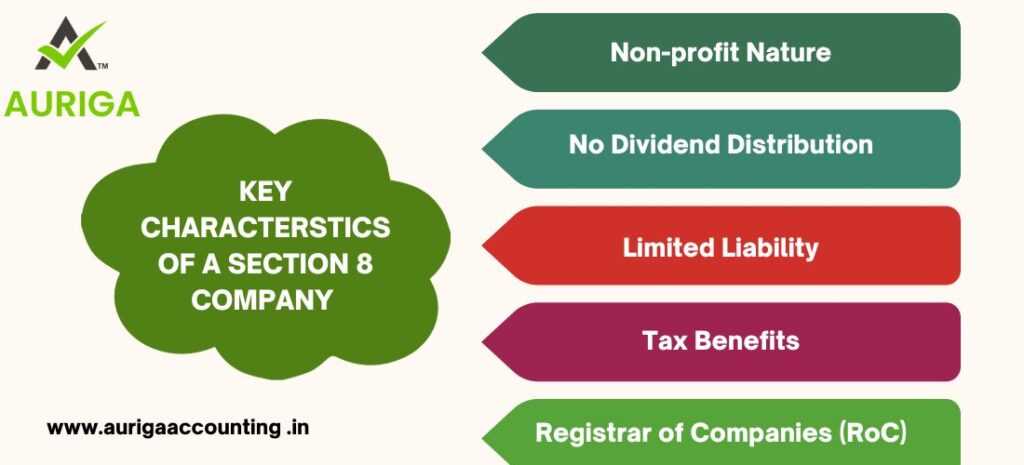
IS THERE A LIMITATION ON THE NUMBER OF ACTIVITIES A SECTION 8 COMPANY UNDER TAKEN?
Introduction
ToggleYOU NEED TO KNOW IS THERE A LIMITATION ON THE NUMBER OF ACTIVITIES A SECTION 8 COMPANY UNDER TAKEN?
Section 8 Companies, also known as not-for-profit companies, are governed by the Companies Act, 2013, in India. These companies are established for promoting charitable and non-profit objectives such as education, art, science, sports, research, social welfare, and more. The primary objective of a Section 8 Company is not to earn profits but to promote the specified objectives. While there is no explicit limit on the number of activities a Section 8 Company can undertake, there are several important considerations and legal requirements to keep in mind. Visitofficialwebsite
KEY CONSIDERATION OF ACTIVITIES IN A SECTION 8 COMPANY
Objects Clause in Memorandum of Association (MOA): The MOA is a crucial document that defines the objectives of the Section 8 Company. While there is no specific limit on the number of activities, the company should clearly outline its objectives in the MOA. These objectives should be in line with the charitable or non-profit nature of the organization. If you plan to undertake various activities, they should be described within the MOA, but they must align with the overall non-profit objectives of the company.
Amendment of MOA: If a Section 8 Company wishes to undertake activities beyond those initially mentioned in its MOA, it can do so by amending the MOA. This process typically involves obtaining approval from the Registrar of Companies (RoC). Amending the MOA can be a detailed and time-consuming process and may involve legal formalities.
Regulatory Compliance: Depending on the nature of the activities, the company may need to comply with various laws and regulations specific to those activities. For instance, if your Section 8 Company is involved in educational activities, it would need to adhere to the Education Act and other relevant laws. It’s crucial to understand and adhere to the specific regulatory requirements for each activity.
Income Tax Exemptions: Section 8 Companies are eligible for income tax exemptions under Section 12AA and Section 80G of the Income Tax Act. However, these exemptions are subject to the condition that the company’s activities are exclusively for charitable purposes. Therefore, it is important to ensure that your multiple activities still align with the charitable nature of the company to maintain tax benefits.
Annual Reporting: Section 8 Companies are required to submit annual reports and financial statements to the RoC. These documents should reflect the activities undertaken during the year. Proper documentation and reporting are essential for maintaining compliance.
Compliance with Foreign Contribution Regulations: If the Section 8 Company receives foreign contributions for its activities, it should also comply with the Foreign Contribution (Regulation) Act, 2010, and the rules and regulations under it. Receiving foreign contributions involves specific reporting and compliance requirements.
TYPICAL ACTIVITIES UNDERTAKEN BY SECTION 8 COMPANY
Promoting Education: Setting up schools, colleges, or vocational training centers.
Advancement of Art and Culture: Supporting artists, cultural events, and art preservation.
Relief Work: Providing relief during natural disasters or other emergencies.
Promoting Health: Running healthcare facilities, organizing health camps, and promoting healthcare awareness.
Welfare of Women and Children: Initiatives focused on women and child welfare.
Environmental Conservation: Initiatives to protect the environment and promote sustainable practices.
Promoting Sports: Supporting sports and athletes.
Religious or Spiritual Activities: Activities for religious or spiritual purposes.
Promotion of Science and Research: Funding scientific research and innovation.
What are the documents required for registering a Section 8 company
The critical documents required for registering a Section 8 company (a not-for-profit company) in India are:
- DIN of the proposed directors: The Directors Identification Number (DIN) of at least two directors is required. The directors must apply for a DIN from the Ministry of Corporate Affairs before registration.
2. Object clause: The object clause of the company detailing the not-for-profit and charitable objectives of the company.
3. Memorandum of Association (MOA): The MOA contains details like the name of the company, registered office address, objects of the company, liability of members, etc.
4. Articles of Association (AOA): The AOA contains rules regarding the internal governance and management of the company. It includes details like share capital, directors, meetings, etc.
5. Consent of the proposed directors: A signed consent letter from the proposed directors confirming their consent to act as directors of the company.
6. Address proof of the registered office: Documents like lease agreement/property tax receipt as address proof of the registered office.
7. PAN card of the company: A copy of the Permanent Account Number (PAN) card allotted to the company.
8. GST registration: A copy of the GST registration certificate, if applicable. Section 8 companies with a turnover of over ₹20 lakhs need to register for GST.
9. Declaration of the proposed company secretary: A declaration from the proposed company secretary confirming their consent to act as secretary of the company.
10. Declaration of the proposed auditor: A declaration from the proposed auditor confirming their consent to act as auditor of the company.
These documents need to be submitted online through the Ministry of Corporate Affairs portal along with the registration fee to register a Section 8 company. It’s recommended to consult professionals to ensure all requirements are met and the registration process is smooth.
Hope this helps! Let me know if you have any other questions.
What are the restrictions on Section 8 companies
In India, Section 8 companies are organizations formed for promoting commerce, art, science, sports, education, research, social welfare, religion, charity, protection of the environment, or any other useful object. Here are some key features and restrictions applicable to Section 8 companies in India:
Non-Profit Nature: Section 8 companies must operate on a non-profit basis, and any income or profits generated must be utilized for promoting the objectives of the company.
Use of Profits: Profits or any income earned by the company are not distributed among its members. Instead, they are applied towards promoting the company’s objectives.
Name Restrictions: The name of the company should end with words like “Foundation,” “Association,” “Society,” “Council,” “Club,” etc., as specified by the law.
No Dividends: Section 8 companies cannot declare dividends to their members.
Government Approval: Before incorporating a Section 8 company, approval from the central government is required. This involves submitting a detailed application along with the proposed memorandum and articles of association.
Alteration of Memorandum and Articles: Any alteration to the memorandum and articles of association of a Section 8 company requires prior approval from the central government.
Regulation and Compliance: Section 8 companies are subject to regulations and compliance requirements set forth by the Ministry of Corporate Affairs and other relevant authorities.
How much is the cost for company incorporation
- Kind of Company of being incorporated – OPC/ Normal Pvt/ Foreign Subsidiary/ Section 8 etc.
- State in which the registration is done (stamp duty variation)
- Amount of share capital in the company
- No. of directors and shareholders in the company
- No. of attempts you are making while registering for the company name
- Complexity in incorporating on case to case basis / re-submission reasons
- Additional efforts, if any (Eg: obtaining any third party approvals during the incorporation process)
Completely depending on case to case basis.
Hope the above clarified. For more queries on company incorporation, please feel free to write in at aditi.bhardwaj@outlook.com
Best regards,

KEY CHARACTERSTICS OF A SECTION 8 COMPANY
Non-profit Nature: Section 8 companies are not formed for the purpose of making profits. Any income generated is used for the promotion of the specified objectives and not distributed among its members.
No Dividend Distribution: Section 8 companies cannot distribute dividends to their members. All income and profits must be applied toward the promotion of the specified objects.
Limited Liability: Members of a Section 8 company have limited liability, meaning their personal assets are generally not at risk in case of company debts or legal liabilities.
Tax Benefits: Section 8 companies may enjoy certain tax exemptions and benefits, provided they meet the criteria set by the government.
Registrar of Companies (RoC): These companies must be registered with the Registrar of Companies and are subject to the provisions of the Companies Act.
Regarding the number of activities a Section 8 company can undertake, there isn’t a specific limit on the number of activities. These companies can pursue multiple activities as long as they align with their stated charitable or non-profit objectives. It is essential that the objectives and activities mentioned in the Memorandum of Association (MOA) align with the company’s nonprofit purpose.
How can a single person incorporate their company
Incorporating a company is the process of creating a separate legal entity that can conduct business, enter into contracts, and own assets in its own name. Here are the steps for a single person to incorporate their company:
- Choose a business name: Choose a unique name for your business that is not already registered in your state or country.
2. Choose a business structure: As a single person, you can choose to incorporate your company as a C Corporation or an S Corporation. You should consult with a lawyer or an accountant to determine which structure is best for your business.
3. Choose a registered agent: A registered agent is a person or a company that receives legal and tax documents on behalf of your company. You may choose to be your own registered agent or hire a professional service.
4. File articles of incorporation: File articles of incorporation with the state or country where you plan to incorporate your company. You will need to provide your business name, business structure, registered agent information, and other details required by the state or country.
5. Obtain necessary licenses and permits: Depending on the nature of your business, you may need to obtain licenses and permits from local, state, or federal government agencies.
6. Draft bylaws and issue stock: Draft bylaws that govern how your company will operate, and issue stock to yourself as the owner of the company.
7. Obtain an employer identification number (EIN): An EIN is a unique number assigned by the Internal Revenue Service (IRS) to identify your company for tax purposes. You can apply for an EIN online or by mail.
8. Open a business bank account: Open a separate bank account for your business to keep your personal and business finances separate.
In summary, as a single person, you can incorporate your company by choosing a business name, structure, and registered agent, filing articles of incorporation, obtaining necessary licenses and permits, drafting bylaws and issuing stock, obtaining an EIN, and opening a business bank account. It is recommended that you seek legal and financial advice before incorporating your company.
CONCLUSION OF ACTIVITIES A SECTION 8 COMPANY
It’s important to note that the Companies Act, 2013, which governs Section 8 companies, emphasizes that the income and profits generated from these activities should be used for the promotion of the specified objects and not for personal gain or profit distribution to the members. Additionally, Section 8 companies may enjoy certain tax benefits and exemptions if they adhere to the regulations and meet the criteria set by the government.
Since laws and regulations can change over time, it is advisable to consult with legal experts and review the latest guidelines from the Ministry of Corporate Affairs (MCA) to ensure that your Section 8 company’s activities are in compliance with the most current rules and regulations. Legal advice tailored to your specific situation is highly recommended when establishing and operating a Section 8 company.
HOW AURIGA ACCOUNTING HELP YOU TO DEFINE ACTIVITIES IN SECTION 8 COMPANY
Financial Consulting: Auriga Accounting may offer financial consulting services to Section 8 companies. They can assist in identifying and defining the activities that align with the organization’s charitable and non-profit objectives while also ensuring compliance with financial regulations.
Budgeting: They can help in creating budgets that allocate resources efficiently among various activities. This ensures that the organization can carry out its activities effectively without exceeding financial constraints.
Accounting and Reporting: Auriga Accounting may manage the company’s financial records, including income, expenses, and assets. They can prepare financial statements and reports that provide insight into the financial health of the organization.
Tax Compliance: Section 8 companies may be eligible for tax exemptions and benefits. Auriga Accounting can help ensure that the organization complies with tax regulations and takes full advantage of available tax benefits.
Audit Support: They can assist in preparing for audits and help the organization maintain financial transparency and accountability.
Compliance Assistance: Section 8 companies must adhere to various legal and regulatory requirements. Auriga Accounting can provide guidance on compliance matters related to financial reporting and transactions.
Grant Management: Many Section 8 companies rely on grants and donations to fund their activities. Auriga Accounting can help in grant management, including reporting requirements and fund allocation.
Risk Management: They can help identify and manage financial risks, ensuring the long-term sustainability of the organization.
It’s important to note that the specific services and assistance provided by Auriga Accounting or any similar service provider may vary. Their support can be tailored to the unique needs and objectives of the Section 8 company. If you’re considering using the services of Auriga Accounting, it’s recommended to contact them directly to discuss your specific requirements and how they can assist in defining and managing the financial aspects of your organization’s activities. Additionally, it’s essential to stay up to date with the latest financial and legal regulations that may affect Section 8 companies in India.












